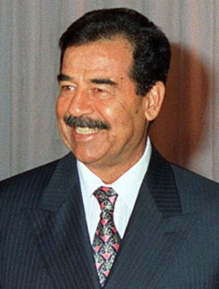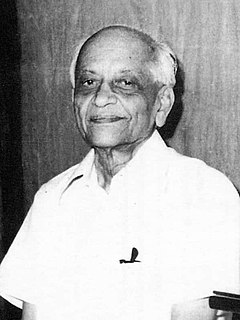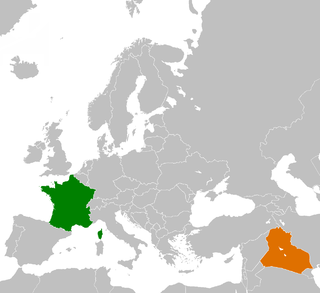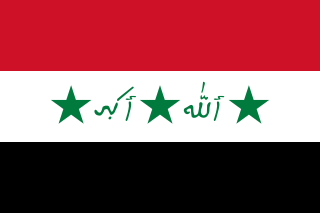
Saddam Hussein Abd al-Majid al-Tikriti was an Iraqi politician who served as the fifth President of Iraq from 16 July 1979 until 9 April 2003. A leading member of the revolutionary Arab Socialist Ba'ath Party, and later, the Baghdad-based Ba'ath Party and its regional organization, the Iraqi Ba'ath Party—which espoused Ba'athism, a mix of Arab nationalism and Arab socialism—Saddam played a key role in the 1968 coup that brought the party to power in Iraq.

The United Arab Republic was a sovereign state in the Middle East from 1958 to 1971. It was initially a political union between Egypt and Syria from 1958 until Syria seceded from the union after the 1961 Syrian coup d'état — leaving a rump state. Egypt continued to be known officially as the United Arab Republic until 1971.

Abd al-Karim Qasim Muhammad Bakr al-Fadhli al-Zubaidi was an Iraqi Army brigadier and nationalist who ascended into power when the Iraqi monarchy was overthrown during the 14 July Revolution. He ruled the country as the 24th Prime Minister until his downfall and execution during the 1963 Ramadan Revolution.

The Communist Party of India (Marxist) is a communist political party in India. It is one of the national parties of India. The party emerged from a split from the Communist Party of India in 1964. The CPI(M) was formed in Calcutta from 31 October to 7 November 1964.

The Communist Party of India is the oldest communist political party in India, and one of the eight national parties in the country. The CPI was formed on 26 December 1925 at Kanpur.
Human rights in pre-Saddam Iraq were often lacking to various degrees among the various regimes that ruled the country. Human rights abuses in the country predated the rule of Saddam Hussein.

The Communist Party of Ireland is an all-Ireland Marxist–Leninist party, founded in 1933. The party is a member of the International Meeting of Communist and Workers' Parties.

The Communist Party of Nepal was a communist splinter group led by Pushpa Lal Shrestha. The party emerged in 1968, as Pushpa Lal organized a separate party congress in Gorakhpur, India.

The Communist Party of Iran (CPI) is a banned Iranian communist party that was created in September 1983. In the context of leftist organizations in Iran, the Communist Party of Iran is considered to an armed, dominantly Kurdish organization. The group supports decentralization within their organization including their armed operations. They advocate for coordinating bodies of structure and general autonomy regarding their structure.

The 1991 uprisings in Iraq were a series of popular rebellions in northern and southern Iraq in March and April 1991 during a ceasefire in the Gulf War. The mostly uncoordinated insurgency, often referred to as the Sha'aban Intifada among Shi'ite Arabs and as the National Uprising among Kurds, was fueled by the perception that Iraqi President Saddam Hussein had become vulnerable to regime change. This perception of weakness was largely the result of the outcome of two prior wars: the Iran–Iraq War and the Gulf War, both of which occurred within a single decade and devastated the population and economy of Iraq.

Shripad Amrit Dange was a founding member of the Communist Party of India (CPI) and a stalwart of Indian trade union movement. During the British Raj, Dange was arrested by the British authorities for communist and trade union activities and was jailed for an overall period of 13 years.

The Iraqi Popular Army also known as the People's Army or People's Militia was a paramilitary organization composed of civilian volunteers to protect the Ba'ath regime against internal opposition and serve as a counterbalance against any coup attempt by the regular Iraqi Army.

French–Iraq relations refers to the relations between France and Iraq. France played a major role in Iraqi secession from the Ottoman Empire and eventual freedom from British colonial status. The Franco-Iraqi relationship is often defined by conflict and peace, with France supporting Iraq during the Iran-Iraq War, supporting intervention in Iraq in Operation Desert Storm, and opposing the 2003 Invasion of Iraq. As of 2004, Iraq maintains an embassy in Paris and France maintains an embassy in Baghdad.

The Kurdistan Democratic Party, usually abbreviated as KDP or PDK, is the largest party in Iraqi Kurdistan and the senior partner in the Kurdistan Regional Government. It was founded in 1946 in Mahabad in Iranian Kurdistan. The party states that it combines "democratic values and social justice to form a system whereby everyone in Kurdistan can live on an equal basis with great emphasis given to rights of individuals and freedom of expression."
Communist Party of India (Marxist–Leninist) People's War, usually called People's War Group (PWG), was an underground communist party in India. It merged with the Maoist Communist Centre of India to form the Communist Party of India (Maoist) in 2004. Muppala Lakshmana Rao ('Ganapathi') was the general secretary of the party. The ideology of the party was Marxism-Leninism-Maoism.

Ba'athist Iraq, formally the Iraqi Republic until 6 January 1992 and the Republic of Iraq thereafter, covers the history of Iraq between 1968 and 2003, during the period of the Arab Socialist Ba'ath Party's rule. This period began with high economic growth and soaring prosperity, but ended with Iraq facing social, political, and economic stagnation. The average annual income decreased both because of external factors and the internal policies of the government.
The National Progressive Front was an Iraqi popular front announced on 16 July 1973 and constituted in 1974, ostensibly formed within the framework of a "joint action programme" to establish a coalition between the Arab Socialist Ba'ath Party, the Iraqi Communist Party, the Kurdistan Revolutionary Party, a pro-government section of the Kurdistan Democratic Party, and miscellaneous independents. The Iraqi Communist Party were removed from the NPF in 1979 while the Kurdish Democratic Party suffered restrictions when Saddam Hussein came to power after 1979. The creation of the Front ensured the leading role of the Ba'athists in state and society whilst allowing limited autonomy for other participating parties loyal to the government. Saddam spoke of it once as "one of the essential forms to voice our will and to deepen democracy and political participation of the people and the national forces in building the new experiment in all fields." In effect the Front was controlled and maintained solely by the Ba'ath, with all other legal political forces acting in subservience to it.

The Tunisian Ba'ath Movement is a political party in Tunisia. It is the Tunisian regional branch of the Iraqi-led Ba'ath Party.

The 1959 Mosul Uprising was an attempted coup by Arab nationalists in Mosul who wished to depose the then Iraqi Prime Minister Abd al-Karim Qasim, and install an Arab nationalist government which would then join the Republic of Iraq with the United Arab Republic. Following the failure of the coup, law and order broke down in Mosul, which witnessed several days of violent street battles between various groups attempting to use the chaos to settle political and personal scores.

Baathism is an Arab nationalist ideology that promotes the development and creation of a unified Arab state through the leadership of a vanguard party over a progressive revolutionary government. The ideology is officially based on the theories of the Syrian intellectuals Michel Aflaq, Zaki al-Arsuzi, and Salah al-Din al-Bitar. Baathist leaders of the modern era include the former leader of Iraq, Saddam Hussein, and the President of Syria, Bashar al-Assad.

















